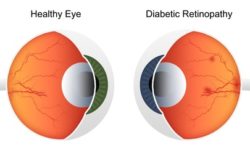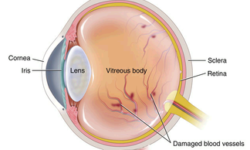0
My cartRetinopathy is a general term used to describe various disorders of the retina. These eye disorders can affect vision. Retinopathy is caused by the tiny blood vessels next to the retina and is often a result of diabetes, hence the term ‘Diabetic Retinopathy’. However, Retinopathy can also be caused by other conditions, such as high blood pressure.
The walls of the blood vessels in our eyes can become weak. Over time, the walls begin to bulge. This creates an ‘eddy’ in the blood flow which can eventually block. Blood and other fluids start to leak into the retina. Hard deposits are left in the retina. Because of the reduction in blood flow, the body grows new blood vessels. However, these veins are fragile and tend to rupture suddenly leaking blood into the vitreous. This will lead to a sudden and dramatic loss of vision. This may clear somewhat over time. Diabetes can have a number of effects on our vision. The most common is on the retina.
Anyone at risk of this eye disease should ensure that they are doing everything that they can to prevent or control the progression of the disease, as it can potentially lead to blindness. By controlling diabetes, the risk of diabetic retinopathy can be reduced by 60%, that’s a decrease in risk by more than half. If you have diabetes, eye tests in the UK are free and yearly appointments are encouraged.




